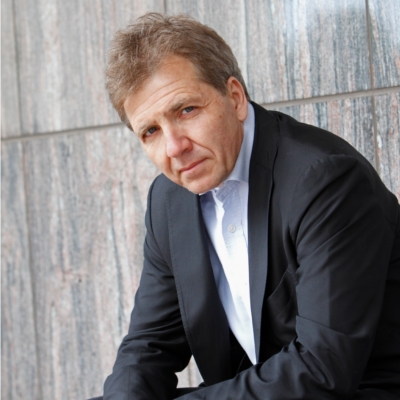Conductor makes inspired Grant Park debut with sensational Saint-Saëns

The omens were not favorable for the Grant Park Orchestra concert Friday night at the Pritzker Pavilion. The godless heat and humidity continued, making the evening a challenge for musicians and audience alike.
Still, those who ventured out—and the Millennium Park audience grew substantially as the evening continued—were rewarded with a terrific concert and a most auspicious festival debut by conductor Thierry Fischer.
Music director of the Utah Symphony since 2009, Fischer just had his Salt Lake contract extended through 2015 and it’s not hard to understand why. The Swiss conductor is the real thing—a musician of clear intelligence, technical skill, and podium personality, drawing performances that blended impeccable balancing, textural clarity and fizzing exhilaration. That he and the orchestra accomplished this under such uncomfortable conditions was even more notable.
With an added intermission due to musicians union regulations during high-humidity nights, the reshuffled program began with music of Fischer’s most celebrated composing compatriot, Frank Martin.
Written in 1949, Martin’s Concerto for Seven Wind Instruments is characteristic of the Swiss composer’s style—-witty and well crafted if just skirting anonymity in its busy, amiable bustle.
Fischer began his career as a flutist, and that training was evident in his alert layering of the varied wind textures. The conductor kept the work within chamber dimensions, drawing out the Prokofiev-like sardonic quality of the central Adagietto as it morphs into a darker dirge-like expression. The tricky rhythms of the final movement were dexterously handled with nimble and spirited playing, rounded off in an emphatic coda.
All the Grant Park soloists (flutist Mary Stolper, oboist Nathan Mills, clarinetist Gene Collerd, bassoonist Eric Hall, trumpet Douglas Carlsen, hornist Jonathan Boen and trombonist Daniel Cloutier) played with admirable technical assurance and clean intonation under the trying conditions. Carlsen and Cloutier brought a degree of extra panache to their opportunities, in a work that requires solo individuality to make an impact.
For all its popularity, Saint-Saëns’ Symphony No. 3 is a difficult work to bring off. Sure, the thunderous coda always stirs up even the most somnolent audience, yet the odd structure—two movements each with intertwined sections–and the notorious balancing challenges can do in even the most celebrated batonsmiths.
Like his compatriot Charles Dutoit, Thierry Fischer clearly has a real gift in French repertoire. Friday night’s memorable performance would have been notable under indoor conditions with more rehearsal time. But for Fischer and the Grant Park team to pull off such a remarkable account of Saint-Saëns’ organ and orchestra showpiece under such trying circumstances was a triumph.
The Adagio introduction emerged too loud, but after that Fischer didn’t put a foot wrong. The conductor understands that, even with its big climaxes, this symphony is all about fine details and textural nuance. Fischer led the first part of the opening movement with Gallic refinement, rhythms lithe and elegant.
Thierry’s careful calibration laid out the scoring with striking clarity, as with the organ pedal points in the Poco adagio, preparing the lyrical theme—Saint-Saëns’ most lush and memorable tune—to steal in magically. Fischer displayed fine control, sculpting the organ, string and wind choirs with acute dynamic detailing, letting the music unfold with a sense of patient inevitability.
The final section was thrilling with Fischer letting the composer’s wacky scoring touches—was the four-hand piano part for just a couple bars a private joke?—come across effectively. Even helming an electronic portable instrument, David Schrader insured that the celebrated organ entrance in the finale made its sonorous impact, and Fischer ratcheted up the momentum with a burst of adrenaline in the exhilarating final bars, holding the massive final chord for an extra bit of weighty resonance.
Along with Fischer, the superb Grant Park musicians deserve acclaim for delivering such combustible playing with polish and commitment on such a humid night.
Far from any sense of anticlimax, the conductor was just as impressive in Berlioz’s rarely heard King Lear Overture, which now served as an apertif of sorts after intermission. (I get that union regulations dictate an interval on humid nights, but why change the order and put the Berlioz as the sole work after the break? It made no sense to have an hour-long first half and 16-minute second half.)
King Lear is one of the most expansive of the many overtures Berlioz would write, closer to a mini tone poem than peppy curtain-raiser. Here too, Fischer drew out the varied strands, from the dramatic opening cello statement—Grant Park principal cellist Walter Haman also plays under Fischer in Utah—to the airy grace of the winds. The jaunty effervescent main theme jars a bit, though Fischer showed how the abrupt dislocations reflect Lear’s increasingly disordered psychology. The Grant Park musicians delivered tight and responsive playing of this overture in its festival premiere.
This was the most impressive Grant Park podium debut of recent seasons and Thierry Fischer has earned himself an invitation back to Chicago. Perhaps next time he can bring music of Othmar Schoeck, Switzerland’s most inexplicably neglected composer.
The program will be repeated 7:30 p.m. Saturday. Admission is free. grantparkmusicfestival.com
Posted in Performances




